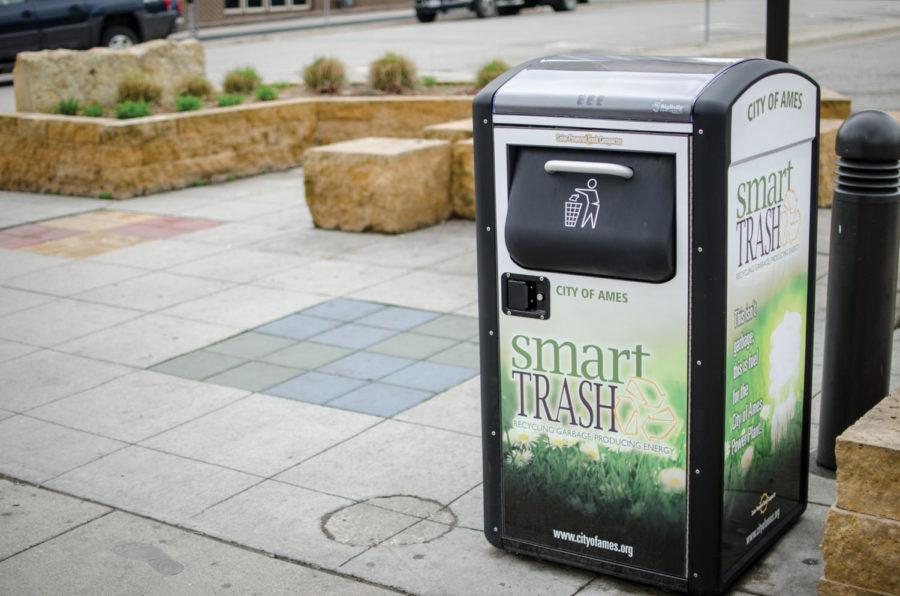Amollo: We really don’t have to recycle
Photo: David Derong/Iowa State Daily
The city of Ames installed BigBelly solar intelligent waste and recycling collection systems at the corner of Welch Avenue and Chamberlin Street, as well as in Tom Evans Park at Main Street and Burnett Avenue. These trash cans compact trash and wirelessly signal when they need to be emptied, cutting down on energy used in picking up the trash.
July 8, 2012
There’s a side to recycling that has not been explored — or perhaps, intentionally ignored: the stupid side of it all.
Proponents of recycling and their fans have littered every corner of society — always reminding us of the benefits and having all, if not most of us, falling for the movement. Nearly every American home recycles, and there’s a student club to recycling effect in every campus of every college, university or high school.
Indeed, this is a movement. Here at Iowa State, for instance, the “green” movement is a big deal and chances are everyone recycles. Please don’t (tongue-in-cheek): It’s bad for the environment. No, really.
The costs of recycling are met by taxpayers and organized by local authorities. The chief argument for recycling bears that it is efficient and thus saves vast amounts of money. Does it really? In some cases, local authorities spend more money recycling wastes than would be used acquiring new ones — costs which ordinary citizens have to meet — because the safety of the environment affects us all. The excessive delivery, sorting, cleaning and manufacturing of new recycled products far outweighs the costs of making new materials and is wildly inefficient compared to making these products from scratch.
The simple truth is that taking waste and disposing it in landfill is far less costly than the many procedures needed turn our rubbish into new coffee cups, hamburger wraps, new tires and toilet seats.
Recycling also creates more environmental damage than disposing of waste in landfill sites. Think about the fumes and sludge created by recycling paper, for instance. When you put an old newspaper into a recycling bin, that newspaper has to be delivered (often hundreds of miles away from the bin you put it in), destroyed, bleached, pressed and re-dyed. All this creates incredible damage to the environment, compared with the relatively simple procedure of taking your waste and putting it in landfill. I’m not saying that landfill sites don’t damage the environment at all, but the effects are minimal compared to recycling.
Regulations on landfill sites include meter-deep layers of clay to prevent damage to the soil underneath and the capturing of methane gas from decomposing rubbish can power thousands of homes. The waste can be buried, layer upon layer, and when the site is full, soil can be put on top and trees can be planted. There are parks in California made on top of old landfill sites, and it’s as if all that junk was never even there.
Then there’s the idea that that recycling saves trees, which is completely the opposite of what’s true. If anything, recycling stops trees from growing. Not to be cynical, but most paper comes from tree farms, where trees are produced all the time to make paper. If you buy and waste more paper, the companies plant more trees to meet the growing demand for paper (they are a renewable resource). By recycling paper, not only are you harming the environment in the bleaching and manufacturing process, but you’re spending less money buying new paper, so there are fewer tree farms grown. The idea that trees are ‘running out’ is pure myth created by recycling plants to increase their government funding — there are three times as many trees now as there were in 1920, and deforestation is largely contained in problem areas such as South America, and that is not due to making paper.
Thus, in communities where incomes are a struggling minimum, the recycling movement isn’t a good idea. In the developing world where there are vast forest covers, this debate thins especially, since the respective governments cannot afford these recycling costs.
The only really useful recycling is of aluminum cans. In this case, the high costs and negative environmental impact is reduced by recycling, but most other forms are completely inefficient and cost us a grave amount of money. Remember, if recycling was efficient and profitable, there would be private recycling businesses that would pay us for our waste, but nearly every recycling business relies on government subsidies for it to stay open. It is against this that we must be wary each time we have to recycle.
Think twice before recycling in the future; your good intentions threaten both our environment and our bank balances. No kidding.







